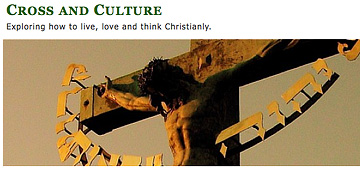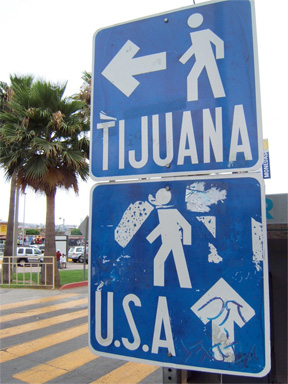First, I want to thank those who commented yesterday. Your honesty, insights, and charity encourage me to believe that it is possible to have a constructive conversation about this divisive issue.
As I explained earlier, I started writing about this issue by participating in a Cross Examinations conversation with eight other Christian thinkers. Some of you may have checked out that conversation already. You’ve seen the diversity and thoughtfulness of the answers there. Today, I’m going to put up some excerpts from several Cross Examination articles, along with links to the whole article and a comment or two from me.
Jeff Barneson is a longtime staff member for InterVarsity’s ministry to faculty and graduate students at Harvard University.
What if God’s intention in the hyper-diversification of our country is akin to what happened when the Romans sacked Jerusalem in 70 A.D.? Historians question whether the message of the early Christians, without the presence of the Romans, would have spread beyond the local setting of Jerusalem. What if the present situation in the United States is just another accelerated opportunity to bring good news to people who are more than ready to hear it?
I believe it with all my heart: If we spend all our time and energy on the policy discussion, and never reorient our perspective and realign our congregations to engage with actual immigrants and their actual circumstances, we may miss out on the extraordinary opportunity that God has placed in front of us.
Read Barneson’s entire contribution here.
MDR Comment: Barneson’s challenge is for Christians to seize the missional opportunity afforded by the immigration of diverse peoples to our country. He is not dealing here with the legal and political issues. Though Christians need to weigh in on these matters too, Barneson reminds us not to let the social matters keep us from seeing the ministry potential before us.
M. Daniel Carroll R. (Rodas) is Distinguished Professor of Old Testament at Denver Theological Seminary and author of Christians at the Border: Immigration, the Church, and the Bible.
What has been disconcerting to me is that all too often Christian responses in the United States to immigration are not different in any substantial way from the responses of those who do not profess the faith. Discussions tend to be limited to protecting national borders and “the American way of life.” There are complaints about the supposed economic costs brought on by added pressures to schools, hospitals, and law enforcement. These are legitimate issues, but there is no explicitly Christian orientation to the debate. If there is, it usually is limited to quoting the call (in Romans 13) to submit to the governing authorities. (Photo: The U.S.-Mexican Border in the San Diego-Tijuana area.)
What might a more fully biblically informed response to the immigration challenge look like? Where would it begin? The starting place of a discussion determines in large measure its tone and content. If we begin with Genesis 1 and the fact that all humans are created in the image of God with infinite worth and great potential, the debate will be quite different than what is witnessed now in media sound-bites. It will focus on persons with needs and gifts that can contribute to the common good, instead of taking a default negative defensive posture against newcomers in our midst.
Read Carroll’s entire contribution here.
MDR Comment: If you read my introductory post in this blog series, you know that I share Carroll’s concern about the lack of distinctively Christian reflection on the immigration issue. I also agree with Carroll that the starting point in this conversation is crucial. He begins with Genesis, which is never a bad idea for Christians. I am impressed enough with Carroll’s thoughts that I have recently purchased and begun reading his book on immigration, Christians at the Border: Immigration, the Church, and the Bible. So far, I am quite engaged.
John March is a church planter, a pastor in Edina, Minnesota, a writer, and a blogger at Pilgrim March.
We are all immigrants and sojourners in the world. As Christians, our primary allegiance is to God and to God’s kingdom. We are first and foremost citizens of heaven. Often times immigrants understand this intuitively because they are outside the dominant power culture in the country to which they come. White Christians living in the suburbs of America (like myself) are wise to recognize this implicit advantage immigrants have in living as though they are aliens and sojourners in the world. There is much we can learn from them. (1 Peter 1)
Immigration reform is complicated. I get that we need laws that govern our borders. We need rules for how people enter our country, and they need to be enforced. Currently, those laws do not work well, and that’s why immigration reform is so crucial. The system is broken and it needs to be fixed. I hope it includes some pathway to citizenship for illegal immigrants who have lived here for many years and are more at home in this country than their country of origin.
In the meantime, I plan to love and welcome anyone and everyone, regardless of legal status. My allegiance is first and foremost to the Kingdom of God, and in God’s government acceptance is preeminent. Join me in loving immigrants and learning from them as we hope for immigration reform that results in a more just and equitable treatment of all people in this country.
Read March’s entire contribution here.
MDR Comment: I agree with March concerning our need to love others, regardless of their legal status. But how does this relate to the government’s need, one might even say, the government’s responsibility, to insure order and punish those who have broken the law? Does the call to love illegal immigrants necessarily mean that we should grant them full and immediate amnesty? Or is love, in this case, more complicated.
Juan Martinez teaches at Fuller Theological Seminary and directs its Center for the Study of Hispanic Church and Community. He also blogs at Caminando con el pueblo.
I do not want to belittle the issue of undocumented migration. But as Christians we need to look at the log in our eye before we can remove the mote in the eyes of the undocumented. The undocumented desperately need fair and just immigration reform. But this will not solve the problem of undocumented migration into the U.S., no matter how much is used for border enforcement. As Christians we need to ask difficult ethical questions about the immigration issue. But let’s address the issues we have created, not only those raised by the wea
kest members of our society, the undocumented.
Read Martinez’s entire contribution here.
MDR Comment: I would be most interested in Martinez’s ideas on what would solve the problem of undocumented migration into the U.S. Some of what he writes in the rest of his article suggests the need for just economic development in Latin America. I’d like to hear more about this. I appreciate his looking at the issue in a perspective that is broader than simply the immigration issue in the United States.
Tomorrow I will continue looking at the immigration issue from various Christian perspectives.

